- Home
- Priscilla Royal
Wild Justice Page 16
Wild Justice Read online
Page 16
Chapter Thirty-one
Will I never be freed from this troublesome maid? Prioress Emelyne thought, as Janeta shuffled into her chamber.
Of late, she had noticed that the woman reeked of sweat and her breath was often foul as if she had just vomited. With disgust, she observed that her robes were stained, worn, and badly mended. Even the pouch at her waist was sloppily patched. Had this maid never learned to ply a needle properly? Of course, her former mistress could no longer provide donated or even new clothing, humble in cut and modest in quality though it might be.
Struggling to contain her annoyance and think more charitably, Emelyne decided she could find her a newer robe amongst those they were planning to donate to the poor. It would be a mercy.
Janeta fell to her knees and bowed her head to the ground.
“Stand up! I am neither the Queen of Heaven nor of England and thus unworthy of such reverence.”
Janeta crawled to her feet but still kept her eyes lowered.
“You are weeping. What has happened?” Emelyne glanced at the rolls and charters still cluttering her floor and tried not to grow angry even as her stomach clenched in frustration over yet another delay in her work.
“My lady, there is a murderer here. I beg you to find me a position outside this priory.”
Emelyne blinked. “I do not understand, my child. The only murderer is your mistress, and she is under guard.”
“No, my lady. Brother Martin was killed.”
“His death was an accident. There is no reason to fear anyone else will suffer a violent death.”
The maid shook her head vigorously. “No, he was killed. I have heard the talk.”
Emelyne was not pleased to learn this. Who was spreading that tale? She did not know who had found the lay brother’s body nor who was present when Brother Thomas examined the corpse. But the monk had declared it an accident. It was true that her brother believed otherwise, and he had told only Father Pasche in the privacy of his chambers at the commandery. Both men she had always trusted to keep secrets. Why would that change now? She must confirm their silence, but she did not see how this tale of murder could have come from them.
As for the Tyndal monastics, she was certain Prioress Eleanor had not spread such a story, confined as she was to her chambers. Whatever quarrel she might have with the Prioress of Tyndal, she was also convinced she could trust her discretion. And why would Brother Thomas spread the tale since he had concealed the manner of death in the first place? She doubted it was he. The only member of the trio she did not have confidence in was the sub-infirmarian. Had she mentioned the monk’s true opinion to her prioress in Janeta’s hearing after that highly questionable consultation near the fishponds? She had little trust in the prudence of Sister Anne.
“Who is telling this?” Emelyne asked.
“I cannot say. I overheard women talking but did not see their faces.”
Or else you do not want to tell me, the prioress thought, noting the maid’s sudden change of color, and felt a flash of anger.
“I fear for my life! You must save me!”
“There is no reason to believe you are in danger here.”
“Mistress Hursel was murdered, now Brother Martin. The nuns convicted my mistress of the first crime, but someone else has shed blood here. This priory is not safe.” She reached out her hands to beg. “Find me a place far away from Mynchen Buckland!”
“We thought you might want to remain here, child, once your mistress died. I would accept you as a lay sister.”
“I cannot remain where I am in danger. Please!” Janeta began to cry.
“There is no place for you in the world,” Emelyne said, more harshly than she intended.
Janeta’s eyes grew wide with horror as she sobbed even louder.
The prioress put a hand on her shoulder. “I know of no one who wishes a servant,” she said.
“Even marriage,” Janeta whimpered. “A husband would protect me.”
Emelyne looked at the maid with amazement. This last remark proved just how irrational the woman was. Arranging a secular marriage was not something prioresses did.
“Calm yourself,” she said. “Go to the chapel and pray for God’s peace. Seek advice from Father Pasche. You will soon realize that staying here is a far better thing than going into the world. If you fear wickedness, there is far more there. You are safest here, both body and soul.”
The terror and grief in the maid’s eyes were undiminished. “Forgive me, my lady, but you are wrong.” Then she leapt to her feet and escaped from the chamber.
Emelyne sat back and stared at the door that Janeta had carelessly left open in her flight.
A nun stepped inside and grasped the handle but hesitated before shutting it. “Do you have any instructions for me?”
“Only that I wish to be left in peace until the next Office.”
The prioress reached for another accounting roll.
Chapter Thirty-two
Eleanor stood near the window, took a deep breath of the spring air, and felt her spirits revive. She might be weary of this game and long to return to her priory, but she was ever more determined to discover the truth in this knotted puzzle. Even though she tried to convince herself that she would be satisfied just to find enough evidence to cleanse the dying woman from her undeserved conviction, she wanted the murderer found and punished as well.
Yet the frustration of thinking in circles remained. All she needed was one small detail to set her on a new path. Just one.
After a knock on the door to announce her presence, Sister Anne entered and immediately asked, “Have you thought more about what we might have failed to see?”
“I fear we know so very little,” the prioress replied, but her voice suggested less discouragement than thought.
“We are therefore no closer to finding out who did the killings.” With little interest, Anne looked down at the activity in the courtyard below. Then she grasped the meaning of her prioress’ tone. “Or are we?”
“The death of Brother Martin may have made those who were willing to accept Prioress Amicia’s conviction on weak evidence less eager to do so.”
Eleanor watched a large bird of indeterminate color land on the nearby roof and aimlessly hop about. The creature reminded her of what she felt she was doing with the facts of this murder, and that almost made her smile.
She turned to Sister Anne. “If we assume that is the case, we might be able to prove Prioress Amicia innocent, even if we don’t find the killer.”
“Once again, I cannot believe you are willing to let a murderer go free.”
“I am not and pray daily that God will bring me the needed insights.” Eleanor glanced at the small altar near the bed.
“Our primary suspects are the former prioress, the current one, Brother Damian, and Father Pasche. You mentioned the steward. Do you think he is likely?”
“Brother Thomas found him innocuous, dutiful, and cheerful. Had he seen anything in his brief contact that suggested a darker aspect, he would have told you. As for the others, there are so many reasons why they could not have killed both. We have spoken of all that.”
Anne nodded.
“Both Prioress Emelyne and her brother seem prone to anger. Brother Thomas has seen the commander be sharp in speech. But we do not know if either had any cause to kill. Brother Damian showed great sorrow over the death of Brother Martin and even asked Brother Thomas to examine the body. That suggests the commander was more concerned about the death than anything our monk might have been doing and, on reflection, makes me waver in my suspicion that he is the murderer.”
“Then let us set him aside for the moment. What about the priest or the prioress?”
Eleanor started to pace but stopped, obviously annoyed with such restricted and boringly repetitive activity. “Prioress Emelyne se
emed willing enough to let Prioress Amicia take the blame for the crime. I assume her brother did as well, since we have not heard otherwise. But they also wanted her to be granted mercy. Instead of letting the Prior cast her from the preceptory to die a hard and lonely death, they begged him to grant her the mercy of remaining here with a priest, medical care, and in an austere but comfortable cell. What does that suggest?”
“We might assume it was an act of mercy because she is dying.”
“Or that her conviction brought some desired result,” Eleanor said, “yet they wished her no ill. I have not met Prioress Emelyne’s brother, but I do not think she is a monster, bred from Satan’s loins. It is quite possible that they both know she is innocent and even feel some guilt for allowing her to take the blame.”
“You have told me that Prioress Emelyne would have been chosen to replace Prioress Amicia on her death anyway. Might there be a reason why an earlier appointment was desired?”
“A well raised question.”
“Brother Thomas did mention that the former prioress had chosen to send more priory income to Clerkenwell rather than do needed maintenance here. Brother Martin had thought the election of Prioress Emelyne would change that.”
“Yet I fail to see how improving the fishponds would warrant the extreme measure of letting an innocent woman be convicted of murder. There must be another purpose, but I fail to see it, unless they know who did the crime and wish to protect that person.”
“And that would make them culpable.” Anne thought for a moment. “Father Pasche? He has long been the priest here and may have gained their loyalty.”
“About him I have made no firm conclusions.” Eleanor sat on the bed, her legs dangling like a child’s, and sighed. “I miss my cot at Tyndal,” she said. “I am too small for horses, fine furniture, and large beds.”
“And you miss your cat,” Sister Anne said. “When Arthur sits on your lap, he often proves inspirational.”
Eleanor laughed. “At the moment, the sight of one of Tyndal’s accounting rolls might supply good motivation to think beyond what we have been doing.”
“What can we do?”
“As I said, we cannot stay here much longer. I must stop pretending to have no interest in this matter and humble myself.”
“Is that wise? Might it even be dangerous?”
“It is wise if I choose the right person to approach. It will be perilous if I am wrong in my judgment.” She held up her hand before her friend had the chance to respond. “If I fear I am talking to the murderer, I shall say nothing about my suspicions and confess only that Prioress Amicia has begged my help to prove her innocence, not find the murderer. I shall have to think quickly, but I will do nothing to imperil our own safety and impede our departure as soon as possible.”
“What do you want me to do?”
Eleanor started to reply and then gestured toward the door. “Where is Janeta?”
“She told me that she had a favor to beg from the prioress.”
“Perhaps she is finished. If so, you must summon Prioress Emelyne. Tell her that I am much improved but must confer with her.”
Anne hesitated as if wanting to argue but chose to say nothing and walked to the door.
Eleanor slid off the bed. “We have not always had much time to talk alone. Before you go, can you think of anything you may have discovered or found curious? I would welcome the most petty or even an arcane detail.”
Anne turned around, her expression thoughtful. “I think I have mentioned everything I thought pertinent, but there was one thing from this last visit with Brother Thomas. It probably means nothing, but I think Janeta is with child. She is ill in the mornings. I believe she vomits because I can smell it on her breath after. She claims this occurs before her courses, yet I have not noticed that metallic smell women often have while bleeding. Her profuse sweating is not uncommon in pregnant women either. Without examining her, I could be wrong, but, if she is, that would explain her troubled manner. Bearing a bastard child would not make her life very easy with a mistress who is dying and no hope of any employment where a child would be welcomed.”
“This news might also imperil the likelihood of her acceptance as a lay sister. How very much alone she must feel,” Eleanor replied. “This news saddens me deeply.”
Then she walked to the window, looked down on the courtyard, and fell into a profound silence.
Chapter Thirty-three
It was Eleanor who opened the door when Prioress Emelyne knocked.
“Let us speak alone,” she said to Sister Anne, and then stood aside as the Hospitaller prioress brushed past her with bristling antagonism.
When the door was shut, Emelyne spun around. “God has kindly healed you more swiftly than any mortal might suppose.” She stared at her nemesis’ foot.
“Would you like some wine?” Eleanor smiled hospitably.
“As I thought you understood, I have little time for idle conversation,” the prioress snapped.
“Nor is that why I asked you to come.”
“When do you plan to leave? It would be a courtesy to let us know so we might make the proper arrangements for the remainder of your time here, as well as for your departure.” Each word could not have been cut off more sharply if it had been sliced with a knife.
“Shall we stop circling each other like warring cats, Prioress Emelyne?”
The woman blinked, but her glare did not waver.
Eleanor handed her a full mazer. “We are both vowed to God’s service and must therefore cast aside many earthly desires and bonds. Is it not our duty to strive toward a better union with His ultimate perfection?”
Now looking perplexed, Emelyne took the wine. “I did not come for a sermon,” she muttered.
Eleanor ignored her. “Yet we are flawed creatures and often fall victim to our own frailties.” Then she stopped before continuing in a conciliatory tone. “I did not ask you to leave your work to hear me preach. As a woman guilty of profound faults, my purpose was to beg your help in a matter we both are vowed to uphold: justice pleasing to God, not to mortals.”
Emelyne opened her mouth to retort. A high color flowed over her cheeks, and she said nothing, stared into her mazer, and then drained it.
Eleanor did not let this silence linger. “You know that Sister Amicia is innocent of murder. I did not have to tell you that. Your conscience has always known it.”
Turning her back, the prioress walked to the ewer, put down her mazer, and bowed her head. “You lied to me,” she said.
Eleanor noticed that the woman’s voice trembled but not, she thought, with anger. “Or did God send me at this particular time and provide a way to keep me here so we could join hands and together find the strength—something no one person could do alone—to execute His will in this matter? His ways are mysterious, as we all know.”
Now Emelyne’s hands were shaking, and she could not fill her mazer.
Eleanor took the cup, poured the wine, and gently offered it to her.
Ignoring the gesture, Emelyne covered her face.
“I am not casting stones, least of all at you,” Eleanor murmured, setting the cup aside, “for I am not without sin.”
Collapsing to her knees, the prioress began to weep inconsolably.
Eleanor knelt beside her and took her into her arms like a mother would a wounded child.
Finally conquering her tears, Emelyne sat back and wiped her cheeks dry. “I know your reputation well. God surely guides you, and I have no cause to doubt your conclusion. How did you determine her innocence?”
“When a murder occurs in a cloister garth, it is a frightening thing for nuns. Gossip may be one of woman’s many faults, but it seems to calm our fears to share news. I learned that lesson soon after I arrived at Tyndal Priory when the same tragedy as you have suffered occurred there.”
&
nbsp; “I had not heard that tale,” Emelyne said with surprise.
“It was then I also discovered the value of listening to every word spoken, even the lowest whisper, and balancing the merits of what I had learned in order to better rule our priory. It is a truth you surely know as well, but you are laden with the hard burdens of taking over from the former prioress under difficult circumstances. You have not had the opportunity to ponder tales, as I have as I lay idle in my bed.”
“Sister Anne overheard these tales as she walked in the garth?” Emelyne spoke with sad resignation.
Despite her delight over this conclusion, Eleanor only nodded in response before adding, “And you told me that your former prioress was mortally ill. I confess I wondered how a dying woman could kill one presumably so much stronger than she.”
“But why did she allow us to condemn her? Why did she not defend herself?” Emelyne’s questions were asked in a tone of curiosity rather than malice. The tears conquered, she also seemed to have banished her initial outrage with her guest.
Eleanor stood and offered her hand to help her fellow prioress rise. “Nor did she confess. Does that not suggest she wanted to avoid an outright lie? Had she been guilty, she would have admitted to the sin.”
“Had she been innocent, she would have sworn to that.”
“Unless she had a reason other than the murder for not defending herself. Was she not reputed to be devout?”
Emelyne agreed.
“Perhaps she was so horrified by finding a woman killed on God’s hallowed earth that she took the desecration on herself. As the prioress, she might have believed the crime occurred because she herself had somehow deeply offended God.”
“I had not thought of that.” Emelyne accepted her refilled mazer, walked to the window, and sipped.
“Sister Amicia is dying. I am sure that, on her deathbed, she would not lie to the priest. If she believed she was to blame for the befouling of this priory because of her own transgressions, she would confess those as well. I find her physical frailty a stronger argument for innocence than her refusal to deny guilt a reason to conclude she had killed Mistress Hursel.”

 The Twice-Hanged Man
The Twice-Hanged Man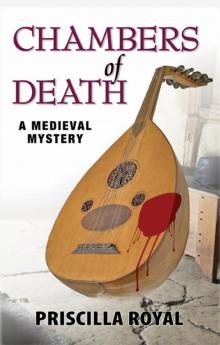 Chambers of Death mm-6
Chambers of Death mm-6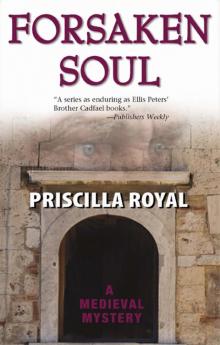 Forsaken Soul
Forsaken Soul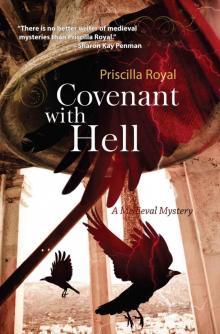 Covenant With Hell (Medieval Mysteries)
Covenant With Hell (Medieval Mysteries)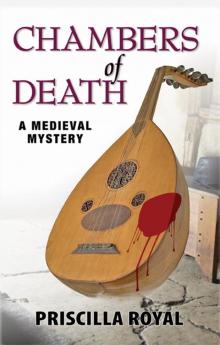 Chambers of Death
Chambers of Death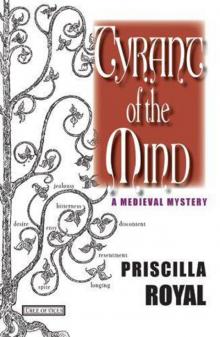 Tyrant of the Mind
Tyrant of the Mind Wild Justice
Wild Justice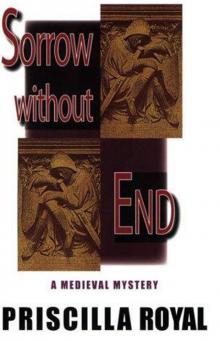 Sorrow Without End
Sorrow Without End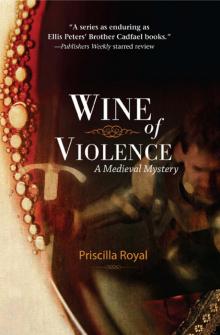 Wine of Violence
Wine of Violence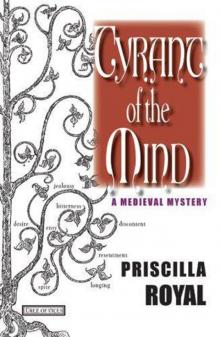 Tyrant of the Mind mm-2
Tyrant of the Mind mm-2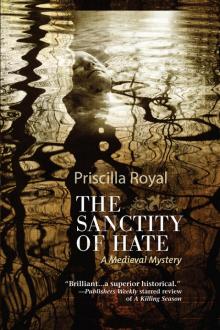 The Sanctity of Hate
The Sanctity of Hate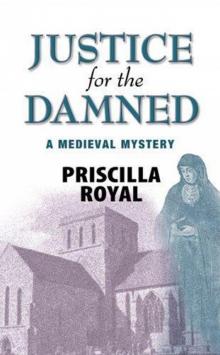 Justice for the Damned
Justice for the Damned The Proud Sinner
The Proud Sinner A Killing Season mm-8
A Killing Season mm-8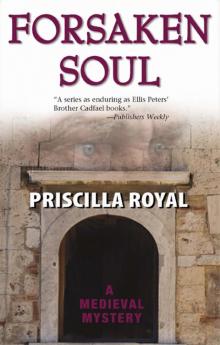 Forsaken Soul mm-5
Forsaken Soul mm-5 Valley of Dry Bones mm-7
Valley of Dry Bones mm-7 Valley of Dry Bones
Valley of Dry Bones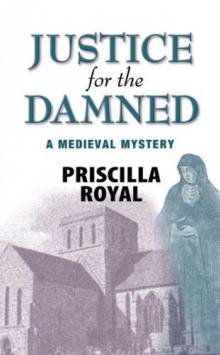 Justice for the Damned mm-4
Justice for the Damned mm-4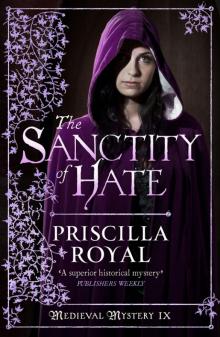 Sanctity of Hate
Sanctity of Hate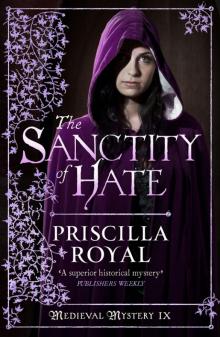 Sanctity of Hate mm-9
Sanctity of Hate mm-9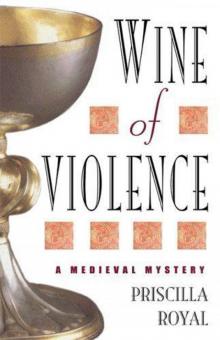 Wine of Violence mm-1
Wine of Violence mm-1